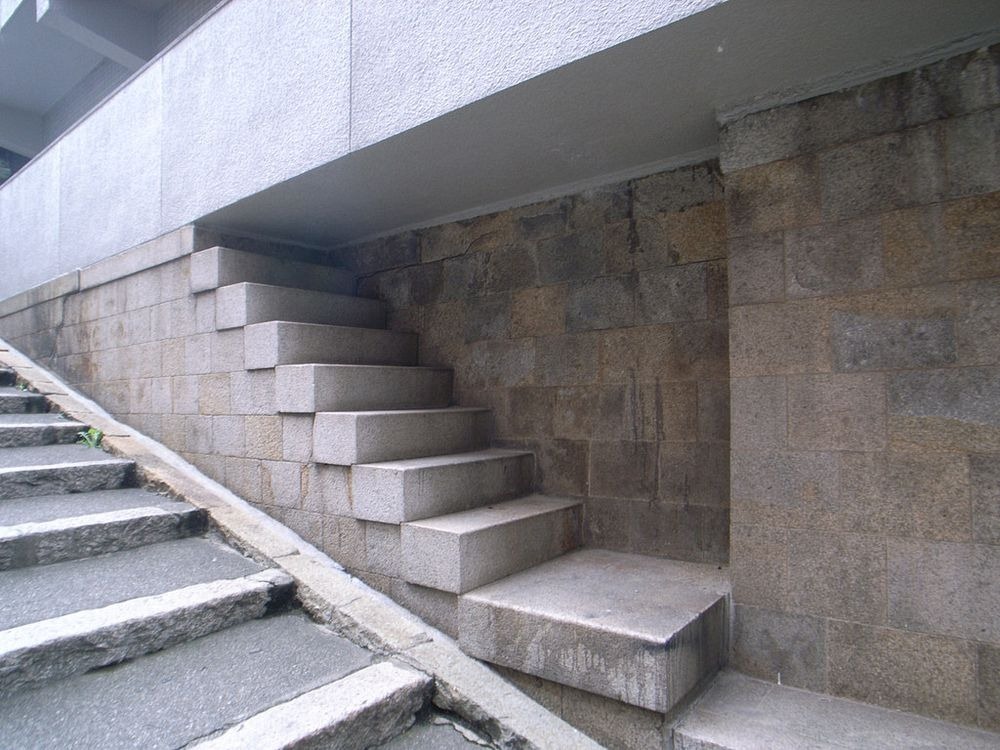A metropolis is similar a living organism , constantly growing in addition to evolving amongst time. Buildings teach renovated , novel structures are added in addition to quondam ones removed , in addition to inwards this procedure bits in addition to pieces teach left behind. We accept all seen them: a flying of stairs that ends inwards a blank wall , a door hovering on the outside of the mo flooring amongst no balcony , a walled over doorway.
These architectural vestiges that serve no purposes accept a name. They’re called “Thomassons” , a term coined past times Japanese creative mortal Genpei Akasegawa , who get-go began to notice these urban relics to a greater extent than or less Tokyo inwards 1972.
A useless staircase at a menage inwards Japan. Photo credit: yosukesan/Wikimedia
While walking to tiffin 1 twenty-four hours , Akasegawa noticed a staircase that had no entranceway when 1 reached the top. But what actually drew his attending were the signs of repair on the handrail on the staircase , indicating that it was however beingness maintained despite the apparent uselessness of the staircase itself. Akasegawa began to try out these strange structures. The next yr , Akasegawa discovered a boarded upward ticket window at a railway station. The plywood used to board upward the window had been cutting neatly to tally the curved rock tray of the ticket window , where it had been worn through years of use. One of Akasegawa’s friend constitute a gateway at a infirmary that had been completely filled upward amongst concrete.
Akasegawa in addition to his friends began calling them “hyperart”. By Akasegawa’s description , “they were similar pieces of fine art that has no operate inwards lodge simply however preserved amongst tending , to the shout out for where it appears to move on display.” But “hyperart” doesn’t accept a creator , in addition to cannot move deliberately created past times an creative mortal , simply solely constitute in addition to recognized every bit such past times an observer.
Those pieces of hyperart were after given the refer "Thomasson." The term comes from Gary Thomasson , an American baseball game histrion who was traded to Tokyo’s Yomiuri Giants. Thomasson was paid an exorbitant total of money for a two-year contract. But when he failed to perform every bit his managers had hoped , he was benched for almost his contract. For Akasegawa , Thomasson was both “useless” in addition to “maintained.”
At get-go , Akasegawa began publishing his Thomasson photographs at a weekly journal column. Eventually , these photographs became a volume titled Hyperart: Thomasson.
Examples of Thomasson
A useless door. Photo credit: Kunitaka NIIDATE/Flickr
A Thomasson tunnel. Photo credit: Wikimedia

Photo credit: petite-tomo/Flickr
Photo credit: twinleaves/Flickr
Photo credit: RawheaD Rex/Flickr
Photo credit: flasksrw/Flickr
Photo credit: flasksrw/Flickr
Photo credit: Caroline Park
Photo credit: Winni Wintermeyer
Photo credit: Winni Wintermeyer
Photo credit: Winni Wintermeyer
Photo credit: Mathieu C
Photo credit: Andria Lo
Photo credit: Seng Chen
Photo credit: Seng Chen
Sources: Wikipedia / 99percentinvisible / 6sqft.com














